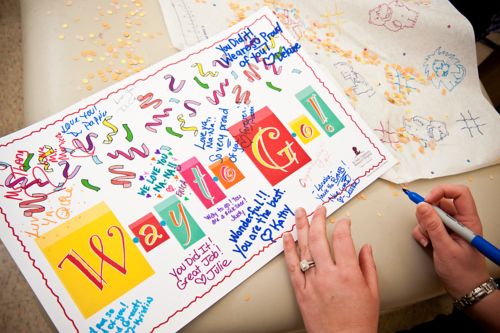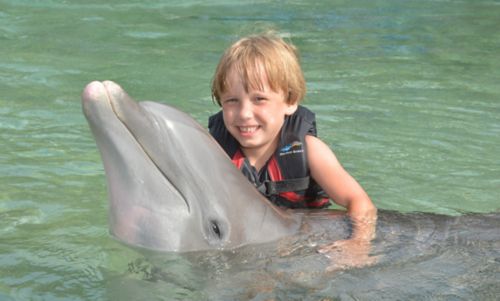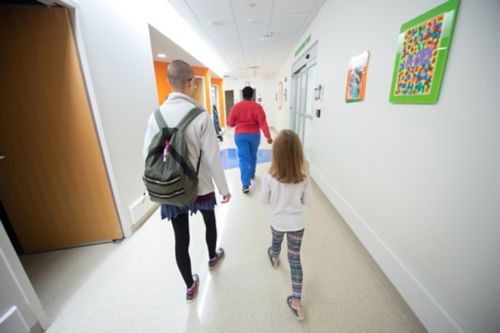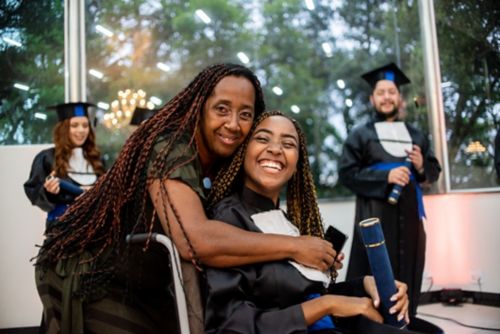While this may be a joyful time, acknowledge other feelings such as sadness and anxiety. Develop strategies to deal with them. Name your fears. Talk to someone about them. Reach out to a social worker, psychologist, or nurse care manager at the hospital. Find a mentor such as a person who has been through a similar situation. Some hospitals have a parent mentor program.
Your child’s health care team supported you during treatment, and you might miss that support when you go home. The end of your child’s treatment can also stir up many different emotions. New sources of support can help you cope.
Your health care team can help you look for support at home, such as family and friends, counselors, clergy, and your children’s school. Tell them about your concerns as your child gets ready to leave treatment, so they can help you start looking for support in your home community.
Help your child transition
Children of all ages can be anxious when treatment ends, but they might have trouble showing or telling you how they feel. Here are some tips for helping children of different ages.
Help your baby (0–12 months)
Babies getting treatment might have fewer chances to explore the world around them and reach developmental milestones. After treatment, your baby will likely begin to develop more quickly.
Building trust with parents and caregivers is important to a baby’s development. That’s because it helps the baby separate from te from you without getting to upset. After treatment, your baby might separate from you easily at home or in other familiar places but might cling to you during clinic visits or in new places. You can:
- Offer comfort positions throughout visits.
- Use the same caregivers when possible.
Help your toddler (13–36 months)
Many toddlers might act more like babies during treatment. For example, potty training might be slow, separating from parents and caregivers might be a challenge, and temper tantrums might increase. Help your toddler adjust to life at home by being consistent and by setting limits. You can:
- Give your toddler choices, when possible, to help them learn to be more independent.
- Allow them to play and express emotions in helpful ways.
Help your preschooler (age 3–5)
Preschoolers need consistent limits at home. Your preschooler might have had extra attention, toys, or other presents during treatment. If they do not get the same amount of attention after treatment, your preschooler can feel like this is punishment. It may take time for them to adjust to this shift in attention and to being a typical kid. You can:
- Offer more chances for free play and art activities to help your child express emotions.
- Answer questions as honestly as possible in words your child can understand.
Help your school-age child (age 6–9) or pre-teen (age 10–12)
If your child has been out of school during treatment, talk to your health care team about whether your child can benefit from a school re-entry program. A re-entry program can help your child’s teachers and fellow students learn about your child’s diagnosis, treatment, and the effects of illness and treatment. Having well-informed teachers and friends can help your child get back on track at school.
School-age children might ask why treatment ended. They may wonder about what will happen now. You can:
- Be honest with your child. Answer their questions as fully as you can.
- Give your child’s classmates safe and appropriate ways to spend time with your child.
Help your teen or young adult (age 13–19)
Challenges for teens and young adults include:
- Going back to friends, classmates, and coworkers
- Rejoining clubs and teams
- Making college choices
- Developing careers
Cancer treatment can affect all these life events. While many teens try to put treatment behind them and not look back, this can actually cause more problems. You can:
- Help your teen or young adult understand that ending cancer treatment does not mean they no longer need health care.
- Share information with peers and coaches while respecting your child’s privacy.
- Remind your teen or young adult that getting back to normal life takes time.
Family adjustment
If you or any of your children have trouble adjusting to life at home, talk to friends, teachers, or a counselor. Counselors can sometimes help kids express feelings they might not share with a parent. Ask your child’s doctor or school about counselors in your area. Camps and support groups give kids and teens with similar health care experiences a chance to have fun together. Here they can share their experiences.







